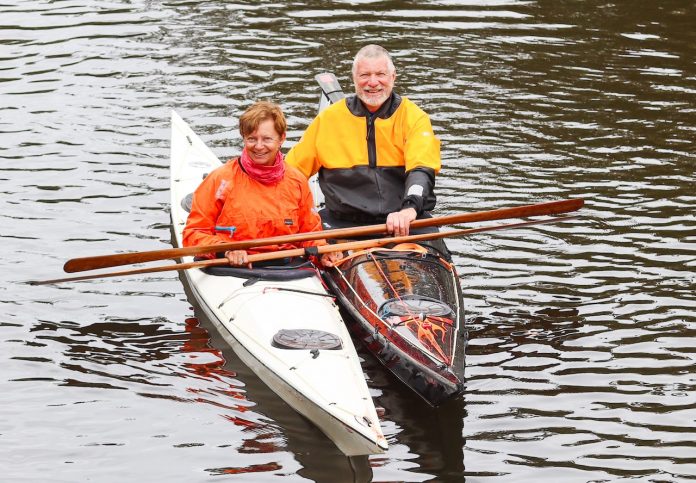Jenni Harrison and Les Allen are passionate paddlers. Now both retired, the couple spend as much time as they can out on the water. They’ve paddled countless kilometres together and, prior to Covid-19, they spent three years kayaking sections of Australia’s east coast.
“We’ve paddled sections of the coastline from Cairns to Tasmania and around countless islands in the Whitsundays. We clocked up more than 6000km in just that trip. It was bliss,” Les says.
This couple love the isolation that sea kayaking offers.
Jenni says: “there’s nothing better than being alone on an isolated island or vast stretch of beach”.
Of course, alone means alone together for these paddling partners. Jenni and Les met during a kayaking club event more than a decade ago. Jenni was already a proficient paddler, and Les was an experienced instructor, and the two quickly formed a bond from which a relationship blossomed.
The couple’s love of adventure has presented them with some amazing encounters with marine life. Les has been menaced by a five metre Hammerhead shark and even had a seal try to steal his paddle. They’ve also encountered challenging weather conditions.
“We’ve paddled up the 15 metre face of a wave in 30 knot winds and in the huge tidal currents in the channel between the northeast tip of Tasmania and Flinders Island. Through all this, the only time I’ve heard Jenni swear at a wave was when a massive one broke right on top of her. She’s a very competent paddler and she’s right up there among the best female kayakers in Australia. And I’m not just saying that because she’s my partner.”
Both agree there’s been moments of incredible beauty too; paddling in still waters by moonlight and having a pod of whales play around and under their kayaks are just some of those memorable moments.
“People underestimate what you can do in a sea kayak,” Jenni says. “It takes a year to really become competent and we now train people on how to be safe out there on the water and what emergency gear to take. Rule number one: always tether your paddles to your boat.”
“We only use traditional sea kayaks as they are far safer than the popular ‘sit-on-top’ kayaks. Traditional kayaks are ones where you sit inside a cockpit so your lower body is encased inside the hull. There’s a ‘spray skirt’ attached to the cockpit opening to keep you warm and prevent water entering. These traditional-style kayaks were invented by the Indigenous peoples of the arctic and they are masters of the kayak.
While kayaking in high seas can be extremely challenging, Jenni reassures people that joining a local kayaking group is more about promoting skills and safety in a social setting. She also says that the sport is becoming increasingly popular amongst women.
“When I first joined the Albany Sea Kayaking Club ten years ago, I was the only female. Now more than 50 per cent of new members are women. It’s still a male dominated sport so we really want to encourage women to take it up. We often run a Wild Old Women On Water (WOWOW) program involving four days of kayaking training mixed with leadership and professional development skills. It’s fully booked every time.”
Jenni also adds that, because kayaking is a low impact sport, you can do it into your 80s and 90s and it’s an activity you can undertake year round.
For anyone keen to try kayaking, Jenni and Les and the South Coast Kayaking group, are running two ‘come and try’ days this November. The first will be at Albany’s Emu Point Marina on 21 November and the second will be at the Denmark River mouth on 28 November. Each session will run from 9am-1pm and you’ll need a kayak with paddles and a life jacket. No experience is needed and the sessions are specifically catered for people over 50.
Anyone wanting information can email tradi tionalkayaking@gmail.com or check out the South Coast Kayakers’ Facebook page.



































